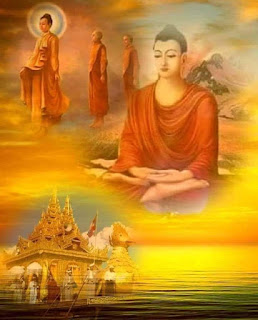The Recollection of the Buddha
There are nine qualities of the Buddha.
1) Araham – worthy one
The Buddha is one
(1) who stands remote and far away from all defilements,
(2) who destroys his enemies, the defilements,
(3) who destroys the spokes of Samsāra, the twelve factors of dependent origination,
(4) who is worthy of receiving the four requisites,
(5) who is absence of secret evil-doing.
2) Sammā-sambuddho – fully self-enlightened one
The Buddha is one who realize the four noble truths with direct knowledge without being guided by any teacher.
3) Vijjā-caraṇa-sampanno – endowed with knowledge and conduct
The Buddha is one who is endowed with eight knowledges:
(1) the insight knowledge,
(2) the supernormal power of mind-made body (mano-mayiddhi),
(3) the knowledge of recollecting past existences,
(4) the knowledge of divine eye,
(5) the knowledge of divine ear,
(6) the knowledge of reading other living being's mind,
(7) the supernormal power of diving into earth etc.,
(8) the knowledge of destruction of taints.
The Buddha is also endowed with fifteen conducts:
(1) observing the precepts,
(2) guarding the sense doors,
(3) moderating in food,
(4) devotion to wakefulness,
(5) being endowed with faith,
(6) being endowed with mindfulness,
(7) being endowed with moral shame,
(8) being endowed with moral dread,
(9) being endowed with Dhamma-knowledge (suta),
(10) being diligent,
(11) attaining wisdom (paññā),
(12) attaining the first jhāna,
(13) attaining the second jhāna,
(14) attaining the third jhāna, and
(15) attaining the fourth jhāna.
4) Sugato – well-spoken one
The manner of going is good, purified, and blameless (sobhaṇa-gata) by noble path without attachment to the direction of safety.
The Buddha has gone to the excellent place, deathless Nibbāna (sundara-gata).
The Buddha has rightly gone without going back to the defilements abandoned by path knowleges (sammā-gata).
The Buddha enunciates rightly (sammā-gada) – he speaks timely fitting to the place. He speaks timely if the speech is true, beneficial, and unpleasant to the listener. He also speaks timely if the speech is true, beneficial, and pleasant to the listener.
5) Lokavidū – knower of the world
The Buddha is the knower of worlds.
The Buddha also knows all beings' habit, their inherent tendencies, their temperaments, and their bents (inclinations).
The Buddha also knows them as with little dust (defilement) on their (wisdom) eyes and with much dusts on their (wisdom) eyes.
The Buddha also knows them as with keen faculties and with dull faculties.
The Buddha also knows them as with good behaviors and with bad behaviors according to their maturity of faculties.
The Buddha also knows them as easy to teach and hard to teach.
The Buddha also knows them as capable and incapable of achievement.
6) Anuttaro-purisa-damma-sārathi – incomparable leader of men to be tamed
The Buddha surpasses the whole world with higher virtue, concentration, wisdom, deliverance, and the knowledge and vision of deliverance.
The Buddha tames those who have not yet tamed. He also further tames those who have already tamed teaching them to attain jhānas, stream-entry path and so on.
7) Satthā deva-manussānam – teacher of men and devas
The Buddha is one who teaches the ultimate goal and the benefits here and hereafter to men and devas.
The Buddha also gets men and devas across the wilderness of birth.
8) Buddho – enlightened
The Buddha discovered the ultimate truths by himself.
The Buddha is also the awakened of others.
9) Bhagavā – blessed one
The Buddha has supreme lordship over his mind (issariya)
. The Buddha has achieved all kinds of mundane and supramundane knowledges.
The Buddha has exceedingly pure fame spreading through the three worlds.
The Buddha has glory of all limbs and perfect in every aspect.
The Buddha has his wish, in other words, the production of what he wanted. (The Buddha wanted the beneficial to himself and others.)
The Buddha has the endeavor, the right effort.



No comments:
Post a Comment